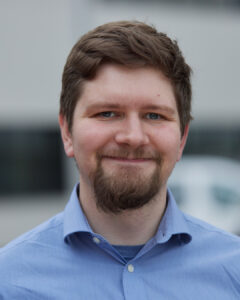Matthew Wade’s Interview
Starting date: 21/11/2022
Nationality : United State of America
Implementing Partner : Forschungszentrum Jülich
Main supervisor: Dr. Aurel Radulescu

Few words about you and your research project
I am a new GNeuS post-doctoral fellow working at the Juelich Center for Neutron Science at the Heinz Maier-Leibnitz FRM II where I am working in JCNS-4 alongside Dr. Aurel Radulescu on the development of extensional flow sample environments for use on the KWS-II beamline.
My work will focus on exploring the structural contributions and interactions between molecules during transient deformations to describe the fundamental physics that give rise to flow phenomena observable on a macroscopic scale.
This project will result in the development of a novel capillary extensional breakup rheometer sample environment and multichannel microfluidic sample cell for use on KWS-II as well as other SANS beamlines.
This work will be carried out in collaboration with Prof. Christian Clasen and Prof. Pavlik Lettinga from K.U. Leuven in Belgium and Dr. Giovanni Vleminckx from Materialise.
What is your background? How have you heard about GNeuS?
I completed my Masters and Doctorate at the University of Illinois Urbana-Champaign where I studied Chemical Engineering with a focus in polymer rheology under the guidance of Prof. Simon Rogers. My thesis work was centered around the development of bottlebrush polymers and studying their rapid self-assembly into photonic structures for applications in direct-ink-writing processes. Specifically, my work combined rheology, imaging, and scattering techniques to characterize structure-propriety-process relations that describe the impact of various flow conditions on the polymer’s microstructure, and corresponding color.
This work served as a part of a larger collaboration between the Rogers, Guironnet, Diao, and Sing groups in an effort to develop bottlebrush polymer inks whose color could be controlled by tuning the printing process.
A complete list of my work can be found at this link.
I learned about the GNeuS program through my Ph.D. advisor and his connections to my current supervisors.
Why did you apply specifically on GNeuS?
The GNeuS Programme serves as an excellent opportunity for me to continue developing my experience with Small Angle Neutron Scattering and diffractometry while also learning about other neutron scattering methods.
The international aspect of GNeuS also serves as a fantastic way for me to establish connections with the global neutron scattering community as well as the European rheological community.
GNeuS also gives me the chance to work with individuals at neutron facilities and beamlines that are being commissioned, such as the European Spallation Source and the SANS-LLB line at PSI.
Being from the US, this program also gives me the chance to immerse myself in a new culture and assist me in developing soft skills involving language and communication.
Overall, the GNeuS programme serves as an excellent opportunity for me to develop both as a researcher with focuses in specific fields and as an individual through a multitude of international experiences.
What impacts do you expect from the GNeuS fellowship?
Through the GNeuS fellowship, I will be undertaking work that focuses on developing in-situ experimental systems and methods that will be made available to other researchers visiting FRM-II after my fellowship has been completed.
From an academic perspective, these new sample environments will allow other researchers to probe the interactions between complex polymers to better understand and model the bulk properties of a material. For the manufacturing and polymer processing industries, the development of these experiments will provide opportunities for companies and researchers to study the properties of complex materials during industrially relevant flows conditions and in turn make it easier to develop these materials for specific applications.
On an individual level, the need to design these systems as easily accessible, easy to setup, a robust from a new user’s perspective will help me grow both as a scientist and as an engineer.
Furthermore, the opportunities to work with individuals in the neutron scattering community as well as attend international conferences and workshops will give me the allow me to numerous connections and collaborations focused on the combination of neutron scattering and polymer rheology.
All of this will help me establish myself in these two fields and allow me to progress towards my goals of working as a beamline scientist at a neutron scattering facility.
